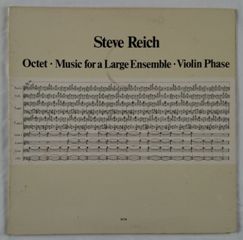Steve Reich – Octet • Music For A Large Ensemble • Violin Phase (1980)
Steve Reich – Octet • Music For A Large Ensemble • Violin Phase (1980)

A1 Music For A Large Ensemble 15:28 Cello – Chris Finckel, Michael Finckel Clarinet – Richard Cohen, Virgil Blackwell Double Bass – Judith Sugarman, Lewis Paer Flute – Mort Silver Marimba – Gary Schall, Glen Velez, Richard Schwarz, Russ Hartenberger Piano – Edmund Niemann, Larry Karush, Nurit Tilles, Steve Reich Soprano Saxophone – Ed Joffe, Vincent Gnojek Trumpet – Douglas Hedwig, James Dooley, James Hamlin, Marshall Farr Vibraphone – James Preiss Viola – Claire Bergman, Ruth Siegler Violin – Robert Chausow, Shem Guibbory Voice – Elizabeth Arnold, Jay Clayton Xylophone – Bob Becker, David Van Tieghem A2 Violin Phase 15:09 Violin – Shem Guibbory B Octet 17:29 Cello – Chris Finckel Clarinet, Bass Clarinet, Flute, Piccolo Flute – Mort Silver, Virgil Blackwell Piano – Edmund Niemann, Nurit Tilles Viola – Ruth Siegler Violin – Robert Chausow, Shem Guibbory
Steve Reich's commercial success had ballooned after his prior release on ECM, Music for 18 Musicians, and this collection of three compositions, two new and one from 1967, was the follow-up. Music for a Large Ensemble is very much of a piece with the prior work, using extended melodic lines, a larger palette of sound colors, and key changes every several minutes. It's charming and pleasantly busy in an industrious way but really covers little new ground. The remaining two pieces are where the real meat lies. Violin Phase was written early in the composer's career, when he was just working through the core ideas of his brand of minimalism alongside similar "phase" works for piano and electric organ. Scored for solo violin and played by the brilliant Shem Guibbory, the violinist plays against tapes of himself, beginning in strict unison but gradually speeding up or slowing down, generating one fascinatingly unexpected pattern after another. The intellectual rigor and breathtaking purity of the music makes one wish, perhaps, that Reich would forego the added ornamentation of his later years. Ironically, given the genre, some of the lines have an almost romantic quality to them, giving the work a striving, even heroic character. Octet represented a step ahead from the opening piece. Scaled back in instrumentation, with spikier (even jazzy) rhythms (bass clarinets scurrying rapidly hither and yon) and more overtly melodic material (some of it inspired by his recent study of Hebrew cantillation), Reich managed once again to successfully balance process with content in a manner that would reach its apex for this period with his subsequent Sextet. Listeners who only came to know Reich through his even more popular works like Different Trains and The Cave owe it to themselves to seek out recordings like this and earlier releases to hear his concept in its clearest and boldest context. Highly recommended. ---Brian Olewnick, AllMusic Review
download (mp3 @192 kbs):
yandex 4shared mega mediafire uloz.to cloudmailru gett








